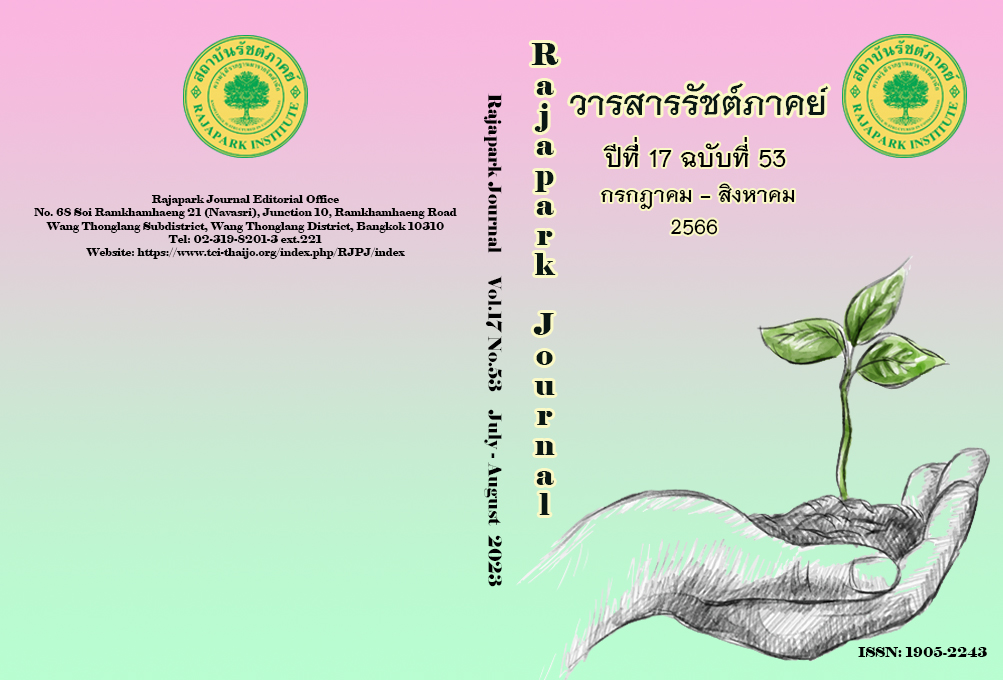Crisis Management for the Survival of the Hotel in Pattaya City, Chonburui Province Under the Epidemic Crisis of The Coronavirus 2019 (COVID-19)
Main Article Content
Abstract
The objectives of this research were to: 1) study the challenges faced by the hotel business operators; 2) analyze the hotel business environment; 3) examine crisis management guidelines for the pre-crisis phases of hotel operation; 4) analyze crisis management guidelines and survival strategies for hotels during each phase of a crisis; and 5) determine an adaptation strategy for hotel survival using qualitative research. The study was conducted in the Pattaya city area of Chonburi Province, with 45 hotel business operators serving as informants. In-depth interviews were used to collect data. The study found that crisis management approaches and survival strategies differed during each phase of a crisis, and that adaptation strategies were necessary for survival. The CAMSA model, which includes four approaches (Change, Alliance, Marketing, and Sufficient Allocation), can be used as a guideline for hotels to survive during crises.
Article Details

This work is licensed under a Creative Commons Attribution-NonCommercial-NoDerivatives 4.0 International License.
Views and opinions appearing in the Journal it is the responsibility of the author of the article, and does not constitute the view and responsibility of the editorial team.
References
Arnanthanasakul, W. (2017). The Alignment of Five-Star Hotel Service Standards in the Service Quality Operations of Hospitel Business: Bangkok Hospital Khonkaen[Master's thesis, Mahasarakham University].
Boontawan W. (2013). Being an Entrepreneur in the Globalization Era. Chulalongkorn University.
Bunchutima, S. (2017). Communication in Crisis. Chulalongkorn University.
Chantapong, S., & Agmapisarn, C. (2021, October 26). Impact and Resilience of Hotel and Restaurant Business Entrepreneurs During COVID-19: Analysis from Outside-In Thinking. https://www.bot.or.th/Thai/ResearchAndPublications/DocLib_/Article_26Oct2021.pdf
Chaiyo, A., & Mahaprom, M. (2020). Crisis Management of Lodging Businesses in Thailand under the COVID-19 Crisis. Dusit Thani College Journal, 14(3), 685-700.
Coombs, W. T. (2007). Protecting Organization Reputations During a Crisis: The Development and Application of Situational Crisis Communication Theory. Corporate Reputation Review, 11, 300–312.
Coombs, W. T. (2010). Crisis Communication: A Developing Field. In R. L. Heath (Ed.), Handbook of Public Relations (2nd ed.). Sage.
Coombs, W. T., & Holladay, S. J. (2012). Managing Corporate Social Responsibility: A Communication Approach. Wiley.
Forbes Thailand. (2020, April 3). Hotel Business Halts, But “Hotel Residence” in Asia is Still Booming Conflict of the COVID-19 Crisis. Forbes Thailand. https://forbesthailand.com/news/travel
Glaesser, D. (2006). Crisis Management in the Tourism Industry. Butterworth-Heinemann.
Hankeawngiatwong, T., & Sanont, R. (2020). Developing Sustainable Tourism Network Collaboration Capabilities of a Community in Huaykaew Sub-district, Mae-On District, Chiang Mai Province. Journal of Social Sciences and Public Affairs Research Network, 3(1), 1-14.
Hoang, T. G., Truong, N. T., & Nguyen, T. M. (2021). The Survival of Hotels During the COVID-19 Pandemic: A Critical Case Study in Vietnam. Service Business, 15, 209-229.
Japutra, A., & Situmorang, R. (2021). The Repercussions and Challenges of COVID-19 in the Hotel Industry: Potential Strategies from a case study of Indonesia. International Journal of Hospitality Management, 95(102890).
McKibbin, W. J., & Fernando, R. (2020). The Global Macroeconomic Impacts of COVID-19: Seven Scenarios (March 2, 2020). CAMA Working Paper, 19/2020. https://ssrn.com/abstract=3547729
Morgan, N. A., Katsikeas, C. S., & Vorhies, D.W. (2012). E/port Marketing Strategy Implementation, E/port Marketing Capability and E/port Venture Performance. Journal of the Academy Marketing Science, 40, 271-289.
Naranong L. (2017). Counseling in Crisis Situations. Sukhothai Thammathirat Open University.
Newsom, J. T., Nishishiba, M., Morgan, D. L., & Rook, K. S. (2003). The Relative Importance of Three Domains of Positive and Negative Social E/changes: A Longitudinal Model with Comparable Measures. Psychology and Aging, 18, 746-754.
Phramaha Siritanano (Sisaket). (2013). Strategic Human Resource Management of Sub-district Administrative Organizations in Laplaismat District, Buri Ram Province[Master's thesis, Chulalongkorn University].
Prachachat Online. (2021, September 2). Hotel Sales Throughout Thailand Struggle with Debt and Can't Handle COVID-19 Crisis. Prachachat. https://www.prachachat.net/tourism/news-750853
Thai Eastern Hotels Association. (2021). Accommodation Seminar 2021. Thai Eastern Hotels Association.
Thansettakij Online. (2021, April 10). Chonburi, the Number of COVID-19 Infections is Zero. Why Did the Hotel Close?. Thansettakij. https://www.thansettakij.com/business/466563
Timothy, W. C. (2012). Ongoing Crisis Communication Planning, Managing, and Responding. Sage.
Yaowaratn, W., Friestad, P., & Chanruang, S. (2017). Causal Factors Influencing Development of Organizational Survival for Companies Listed in Thailand. Suranaree Journal of Social Science, 11(1), 109-129.


